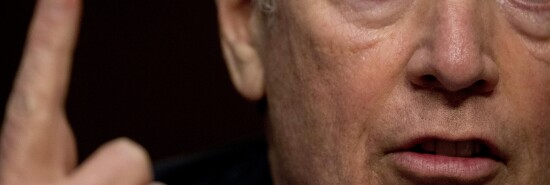
Lighthizer’s terrible new book
Dan Hannan
Video Embed
You know what bothers me about these new-breed protectionists? It’s not that their solutions would leave everyone poorer, especially the blue-collar workers whom they eulogize from the outside. It’s not their belief that they have a monopoly on patriotism. It’s not even their stubborn aversion to data — specifically, to the evidence that lowering trade barriers has done more for the poor than any other policy in human history.
No, what really bugs me is their claim to have some cutting-edge idea, when, in fact, they are recycling the oldest and worst ideas in economics, ideas already refuted by Adam Smith by the time the United States became a republic.
VIVEK RAMASWAMY ENDORSES ETHANOL SUBSIDIES: ‘TRUE CONSUMER CHOICE’
Robert Lighthizer, who served as U.S. Trade Representative under President Donald Trump, has written a dreadful book called No Trade Is Free. Like all mercantilist tracts, it is presented as an original response to previously unencountered challenges — the trade deficit, the supposed immiseration of the working class, the rise of China. Like them, it is based on a series of false assumptions and category errors. And, like them, it will sell. Protectionism is always popular.
I have nothing against Lighthizer. The old Bob Dole enthusiast always struck me as a civil and civilized man. But his claims need answering, not least because, as he correctly says, we are lurching away from free trade.
In one passage, he writes about me — or, at least, about people who think like me:
“The Conservative party in the United Kingdom is composed of many people who were for withdrawal [from the EU] but also for free trade. That never made much sense to me. To be in favor of national control of your institutions and government while being unconcerned about maintaining some level of self-sufficient economy seemed contradictory.”
Au contraire, as we Brussels veterans say. We wanted national control of our institutions because we felt we were better judges of our own interests than the Eurocrats. Among other things, we wanted to escape from protectionist policies imposed in the interests of continental lobby groups. Why should British consumers have to pay tariffs on Turkish olive oil or Floridian orange juice? Even from a protectionist perspective, whom were we protecting?
The mistake Lighthizer makes is to confuse national control with the national interest, as if politicians always govern wisely in the interest of the greatest number. That is not how politics works. Interest groups press governments to privilege their sectional interests. They don’t phrase it that way, of course. Instead, they talk of “protecting strategic industries” or “being self-sufficient” or “not depending on unfriendly regimes.” But every tariff, every quota, every market distortion rewards a politically connected lobby at the expense of the general population. If we define the national interest as the interest of the nation as a whole, free trade is it.
Lighthizer thinks that China engages in industrial espionage and intellectual property theft. He is right. But you address that problem by policing the rules, not by imposing tariffs, which hurt you much more than the other country.
Sure, import controls will reduce trade with China. But according to the International Trade Commission, “US importers have borne almost the full burden of Section 301 tariffs,” a finding endorsed by the U.S. Chamber of Commerce and almost every economist.
Tariffs might briefly help one industry, but always at a cost. Steel tariffs destroy many more jobs in construction and car-making than they prop up in steel. Sugar tariffs destroy six jobs in food processing for every laborer they support on a Floridian plantation. Consumers end up with less to spend on everything else. The U.S. Tax Foundation calculates that tariffs on China are “equivalent to one of the largest tax increases in decades,” destroying 173,000 jobs.
It is against this background that protectionists rhapsodize about the horny-handed sons of toil they imagine they are helping (as I say, from the outside — Lighthizer, not untypically, is a lawyer). Ross Perot purported to hear the sucking sound of disappearing jobs, but NAFTA led to more, and more well-paid, jobs than ever before in U.S. history.
CLICK HERE TO READ MORE FROM THE WASHINGTON EXAMINER
Not that jobs should be our chief objective. Jobs are a means to the end of greater prosperity. If we can live better while working shorter hours, which is what specialization delivers, that is a good thing. Jobs are a cost, not a benefit.
The goal is for people to live happier, more fulfilled, and freer lives. One way to do that is to allow them to buy what they want from whom they want without a state bureaucrat criminalizing their transaction. Free trade makes every country that embraces it richer; yet, generation after generation, we refuse to see it.
